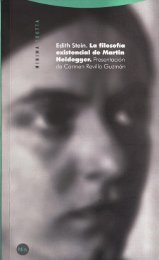The Collected Works of EDITH STEIN ON THE PROBLEM OF EMPATHY
Create successful ePaper yourself
Turn your PDF publications into a flip-book with our unique Google optimized e-Paper software.
106 Edith Stein<br />
center or the "1" kernel is surrounded by the "I"<br />
body. Nor.r', strivings can indeed exist in the "I" but<br />
outside <strong>of</strong> the "I" center in the "l" body. Thus in<br />
this sense they can be experienced as eccentric<br />
strivings.rl'<br />
'Ihe distinctior.r between "I" kernel and "I" body seems to be in<br />
accordance with our distinction between central and peripheral<br />
personal levels. <strong>The</strong>refore, central and eccentric strivings would<br />
burst forth from different levels, have different "I" depths. However,<br />
this description does not seem to me correct. <strong>The</strong> really<br />
justified distinction benveen central and eccentric strivirrgs seems<br />
to be entirely different. As far as I can see, we are talking about<br />
different modalities <strong>of</strong> accomplishing the act <strong>of</strong> striving. Central<br />
striving is a striving in the form <strong>of</strong> the cogito: eccenrric strivings<br />
are the corresponding "background experiences." But this does<br />
not mean that striving has no "I" depth at all. If a noise arouses in<br />
me the striving to turn myself toward it, unless I reflect I do not<br />
actually find that I experience something here other than the<br />
pure "I" on rvhich the "pull" is exercised. Nor do I expcrience it<br />
as arising out o1'some depth or other. On the contrarv. sometimes<br />
I experience "sources" from which the striving proceeds,r3('such<br />
as a discomfort, a restlessness, or something similar. Because they<br />
originate in this source, strivings have a secondary depth and<br />
constitutive sigtrificance for personality, namely, if personality's<br />
source first becomes visible in striving. Furthermore, the stubbornness<br />
and the intensity <strong>of</strong> a striving rhen turns out ro be<br />
dependent on the "I" depth <strong>of</strong> its surce and thus accessible to a<br />
rational lawfuh'ress. Meanwhile, the pure striving that does not<br />
arise experientially out <strong>of</strong> a feeling is neither rational nt>r irrational.<br />
According to Pfdnder, willing is ahvays "I" centered in contrast<br />
u'ith striving.r3r \4/e agree with him rr'hen we translate this into<br />
our interpretation. 'f he volitional decision is always carried out in<br />
the form <strong>of</strong> the "cogito." As rve already kr-rou', this savs lrothing<br />
about the u'ill as "self'experiencinp;." According to Pfiinder:<br />
If it is to be a genuine volitiolt, then our orvn "I"<br />
must n()t rtnly be thought but be immediately c

















